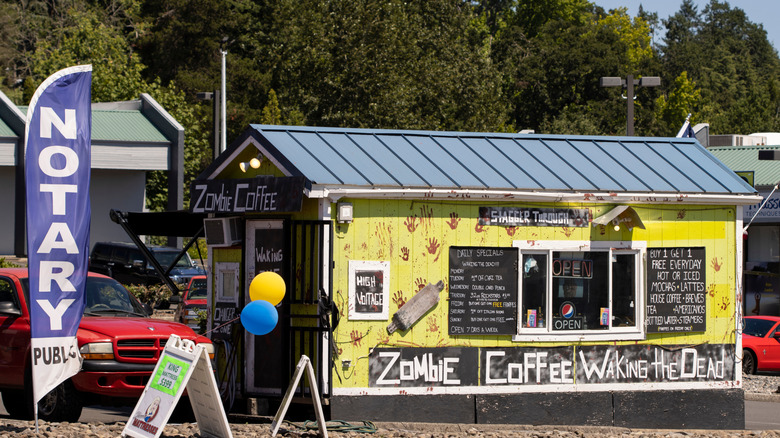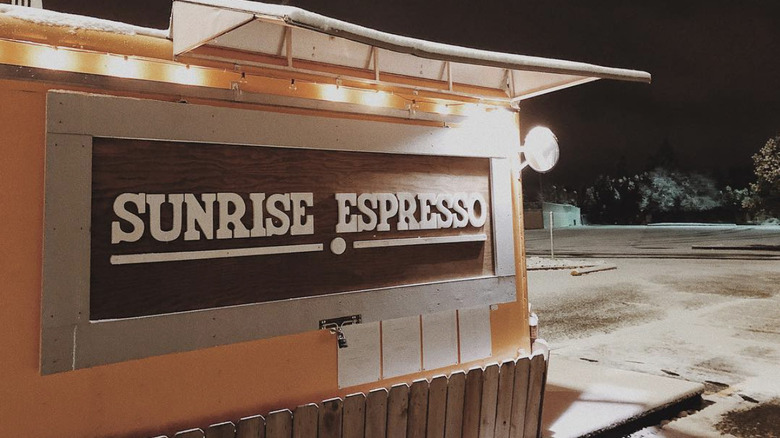The Best Coffee In The Pacific Northwest Isn't From Starbucks, It's From A Kiosk
When people think of the Pacific Northwest (PNW), they likely think of rain, beautiful landscape, and coffee — Starbucks coffee usually. While Starbucks did open its first location in 1971 at Seattle, Washington's Pike Place Market, many of those who call the PNW home prefer to frequent different establishments like coffee kiosks, stands, or shacks (the name has yet to be solidified). Travel west and you'll notice an influx of seemingly random drive-up coffee stands in varying shapes, sizes, and colors. From reimagined Fotomat huts to shacks resembling lighthouses, like Lighthouse Coffee Co. on the Oregon coast, these little coffee huts seem to be on every block, and the locals are quite fond of them and the coffee they serve. After a while, you'll realize that there's no need to venture for an expensive Starbucks drink when great coffee is all around you.
One Redditor on the r/Washington subreddit noted that leaving the area means more work for good coffee. "They are everywhere. It is a unique thing to Washington. Go to other states, and it is difficult to find a good cup of coffee. Seems like every town, no matter the size, has one." Another states, "Obviously, Oregon has a ton of them, too. But I've not seen nearly as many outside of the PNW." The title of the first-ever drive-thru coffee stand is held by a now-closed shop in Portland, Motor Moka, which opened in 1990, and the idea has been popularized by large names like Dutch Bros., which also started in Oregon. The question remains, though, why are there so many small coffee kiosks when popular brick-and-mortar options exist?
Why choose coffee kiosks over brick-and-mortar coffee shops?
For many, owning a brick-and-mortar coffee shop feels like a pipe dream, but owning a coffee stand is often more attainable for various reasons. The Takeout spoke with Amanda Andersen, owner of Sunrise Espresso in Salem and Silverton, Oregon, who has two coffee stands and a mobile event trailer under the same name. After working at the first stand for almost a decade, Andersen received the opportunity to buy it and decided to go for it, and has been expanding from there. When asked if she thinks coffee kiosks are a part of Pacific Northwest culture, her answer was loud and clear, "Absolutely."
When asked what might make coffee kiosks more appealing than owning a traditional coffee shop, Andersen didn't have a definitive answer, but speculated that cost is a large factor. "I think real estate is hard to find and expensive to own, and renting is really not fun, so I think that makes the kiosks more appealing." Coffee kiosks are often rather small spaces, similar to the now-popular "tiny homes" in size, and can only accommodate one or two individuals working at a time. Many are only staffed by one person for several hours, and that person may also be the owner of the stand. This, combined with usually little or no food options, gives kiosk owners the ability to keep overhead costs relatively low. The lower operating costs open the doors for stand owners to focus on providing delicious and creative beverages that may not be available at larger coffee chains. Whether you start your morning with coffee or tea, you'll likely find a coffee stand in the PNW that can serve up a beverage that tastes like a warm hug.

